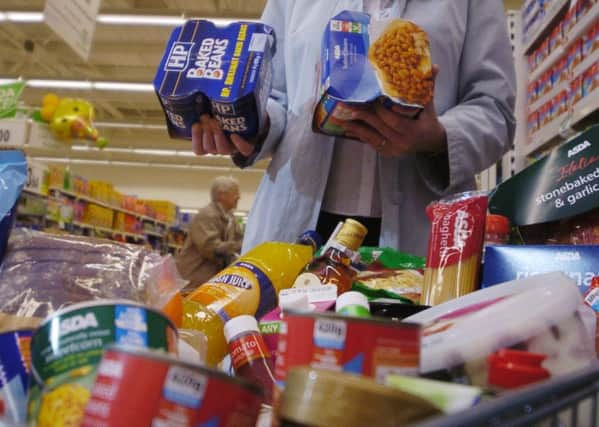Inflation stays at 0.6% despite rising food prices
This article contains affiliate links. We may earn a small commission on items purchased through this article, but that does not affect our editorial judgement.


The consumer prices index (CPI) measure of inflation stalled in August after stepping up in June and July by 0.5 per cent and 0.6 per cent respectively, the Office for National Statistics (ONS) said.
Economists had expected CPI to accelerate to 0.7 per cent, but the ONS said there was “little sign” of the plunge in the value of the pound to 31-year lows following the Brexit vote being passed through to consumer prices.
Advertisement
Hide AdAdvertisement
Hide AdHowever, the producer prices index was impacted by the sterling’s slump, with input prices rising 7.6 per cent in the year to August and imported material prices climbing by 9.3 per cent.
The fall in the value of the pound makes British goods cheaper to export on the global market, but makes imported goods and products more expensive.
The retail prices index (RPI) – a wider measure of inflation that includes housing costs – fell to 1.8 per cent in August, down from 1.9 per cent the previous month.
Mike Prestwood, head of inflation at the ONS, said: “Fuel costs falling more slowly than a year ago as well as rising food prices and air fares all pushed up CPI in August, but these were offset by hotels, wine and clothing leaving the headline rate of inflation unchanged.
“Raw materials costs have risen for the second month running, partly due to the falling value of the pound, though there is little sign of this feeding through to consumer prices yet.”
The main upward pressure on CPI came from transport prices, which jumped by 0.9 per cent between July and August, as motor fuels fell by less than they did a year ago. The price of petrol at the pump dropped by 1.8p a litre to 110p in August, while the price of diesel also edged down 1.2p to 111.8p. Diesel prices had fallen by 6.2p a litre in August 2015.
Air fares were also pushing up the cost of travel, lifting by 14.4 per cent between July and August as European routes became more expensive.
Meanwhile, food prices rose by 0.6 per cent over the period, compared with a 0.2 per cent fall between the same two months last year. Breads, cereals and meat products all proved pricier in August.
Advertisement
Hide AdAdvertisement
Hide AdThe jump in prices comes despite a supermarket price war raging through Britain’s fiercely competitive grocery sector, which has seen the “big four” retailers slash prices to protect their market share from the rise of German discounters Aldi and Lidl.
The main downward impact on CPI came from restaurants and hotels, which saw prices drop by 0.4 per cent between July and August.
Clothing and footwear also helped push up the cost of living, rising by 1 per cent over the period, compared to a jump of 1.5 per cent over the same two months in 2015.
The ONS said the cost of alcohol was also having an impact, with prices rising by 0.3 per cent between July and August in contrast to a 2.4 per cent leap in 2015. This was driven by wine prices, which rose by less that they did a year ago.
August’s CPI announcement comes during a busy week for the UK economy, with the latest employment data being released tomorrow and the Bank of England’s interest rate decision following on Thursday.
The outlook for economic growth has brightened in recent weeks, with manufacturing and services PMI survey for August showing a bounce back in activity after July’s slump.
The economy’s resilience has prompted some economists to up their growth forecasts for UK GDP as Brexit uncertainty eases. However, Standard & Poor’s has panned the recent positive economic data, dubbing it a “mirage” and warning of a “cloudy” outlook for the country.
